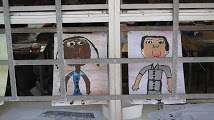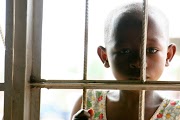Tags
Fred Mednick, global education, JHUglobaled, Johns Hopkins University, Teachers Without Borders, TWB
 As a high-school principal in the 80s and 90s, I sought a global perspective on issues of education, childhood, the future, and an increasingly technological world. I have always been disturbed by educational injustice (the knowledge haves and have-nots). I wanted to remove barriers and borders in order to level the learning playing field. I was antsy.
As a high-school principal in the 80s and 90s, I sought a global perspective on issues of education, childhood, the future, and an increasingly technological world. I have always been disturbed by educational injustice (the knowledge haves and have-nots). I wanted to remove barriers and borders in order to level the learning playing field. I was antsy.
I looked outside my window and, frankly, I was both bored and claustrophobic. Bored by the tyranny of the urgent (yet, in perspective, not urgent at all), and claustrophobic about not being able to reach beyond the boundaries of my school.
I told myself that I really had very little to complain about. After all, I have had the good fortune of running the finest schools in two major cities, each with an innovative and caring faculty. I was even ashamed of myself for feeling comfortable.
Perhaps too comfortable. Having lived in China and the Middle East, I wanted to be challenged by new ideas. My parents once told me a story about Elie Wiesel, the holocaust survivor and Nobel Prize winner. When he came home from school each day, Dr. Wiesel’s parents did not grill him about whether or not he got good marks. Instead, they asked: “Did you ask any good questions today?”
I had plenty of my own, and I have always felt that curiosity is the soul of education. I wanted to ask good questions. I longed to be in and of the world, rather than a distant bystander. After several conversations with the faculty, I was supported in my quest to earn my doctorate.
I decided to study the qualities of an educated young person for the 21st century and so began to reach out to teachers. To get the conversation going, I asked teachers around the world to describe what they saw outside their windows.
I asked them to abstract a little and reflect on their views of education. I knew the question was a bit abstract. I feared that nobody would respond. I was, simply, curious.
 Somehow, the word got out. With humility and grace, teachers flooded me with generous, insightful stories about the views outside their windows. They changed me. They still do. I realized quickly: brains truly are distributed throughout the world. To understand this, one only need ask an intriguing question!
Somehow, the word got out. With humility and grace, teachers flooded me with generous, insightful stories about the views outside their windows. They changed me. They still do. I realized quickly: brains truly are distributed throughout the world. To understand this, one only need ask an intriguing question!
On one particularly pivotal day, a teacher from Norway and another from Nicaragua described what they saw outside their windows. The Norwegian, feeling trapped by dark northern days ahead, longed to bask in the sun. At the other end of the world, a Nicaraguan teacher, having suffered through weeks of unbearable heat, expressed her longing to see snow for the first time.
I connected the two teachers, and what followed was a set of interactions so rich, so filled with humility, hospitality, and friendship, that I announced my resignation from my comfortable job as a principal in 2000 and launched Teachers Without Borders (TWB), a global non-profit designed to connect teacher development with global challenges.
The vision of the organization has not changed. Teachers remain the true catalysts of change, the acupuncture points of our society, and the glue that holds our world together. At 59 million, they represent the largest professionally trained group in the world…and our only hope for a sustainable future.
Thirteen years later, with a tiny staff and an army of volunteers, Teachers Without Borders has been embraced by members in 184 countries. When something happens in the world, I contact a teacher who lives there.
And when I do, I’m never disappointed. TWB is an organization comprised of teacher leaders, worldwide. All TWB programs are conceived and led by teachers. It’s an inspiration.
I often tell stories of teachers who don’t have time—but somehow make time—for students, their parents, and their communities. Teachers who don’t have much pocket change, but who make change anyway. Teachers may not have resources, but they fashion them from local materials, their own creativity, and from the expertise of colleagues. Teachers do not have publicity firms, yet are somehow capable of transforming thousands, regardless of who is looking. Teachers know who is sick or missing or orphaned by AIDS. Teachers are the ones with their ear to the ground, listening for a community’s pulse. Teachers know that they cannot wait for an act of Congress before they can perform; rather, they perform acts of conscience every single day.
Unfortunately, the voices of teachers are rarely heard. More often than not, they are demonized as the problem, rather than the solution. And in far too many cases, teachers have been one of the first victims of outright attack. After all, those who seek to tear a society down go after its pillars – the teachers.
In many settings around the world, the view outside one’s window may appear bleak: natural and national disasters, communities at risk, and countries in turmoil. But we’re teachers, and so we’re back at it every day. We simply have no time to waste.
Some day, I hope to meet the Nicaraguan and Norwegian teacher who inspired me to start Teachers Without Borders, but it matters little; I still hold them close.

Wow Fred! It’s been three years and I’ve missed the interaction. You’re stories still warm, inspire and awe me. Thank you for sharing! I can’t wait to hear more!
Thanks, Lisa. I didn’t even realize I could see my comments! Yikes…sometimes I think I’m a moron. Here’s a link to the entire book: http://bit.ly/TWB-OMW